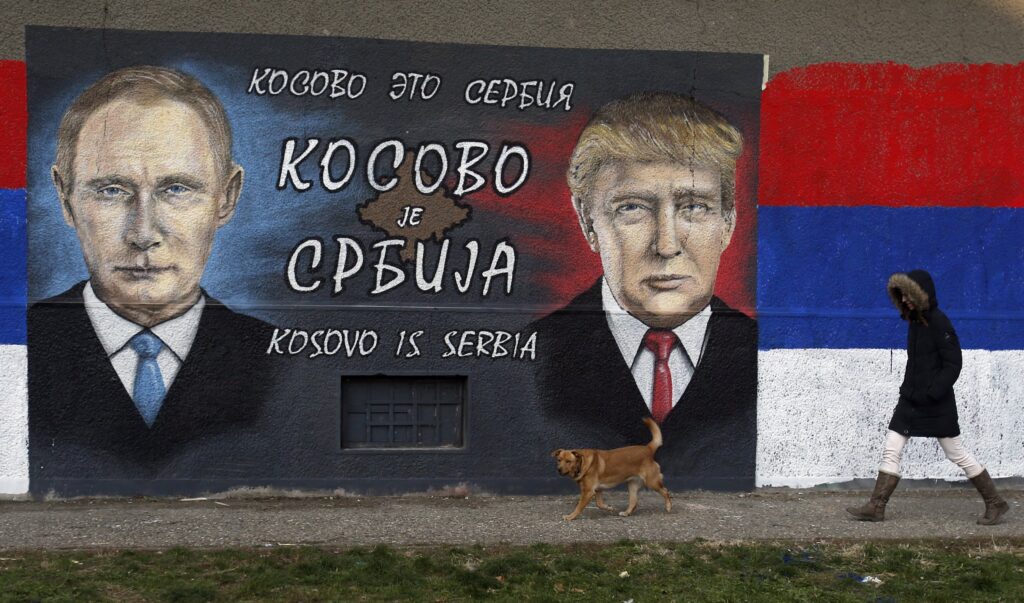
by PAUL ANTONOPOULOS
U.S. is pushing for a new provocation against Serbia over the Kosovo issue 2
Belgrade and Pristina have resumed dialogue in Brussels, but the recent delivery of American-made armored vehicles to Kosovo could make the talks difficult and signifies Washington is once again attempting to destabilise the Balkans. Serbia and Kosovo returned to the negotiating table on July 16 after a long hiatus; however the hopes of Josep Borrell, head of European diplomacy, to allow a constructive dialogue could now be in jeopardy. Washington’s delivery of Humvee armored vehicles to Pristina is a clear message to Belgrade that the U.S. will continue recognising Kosovo’s independence. Washington purposefully sent the armored vehicles knowing it will create tensions in negotiations between Belgrade and Pristina.
The U.S. is putting pressure on Serbian President Aleksandar Vučić to recognise Kosovo’s independence. However, this is in detriment to international law and UN Security Council resolution 1244, which is still valid and specifies that Kosovo is a Serbian province despite Washington’s recognition of its illegal independence. Although the delivery of Humvee armored vehicles makes little impact on the military capabilities of Kosovo, it is a symbolic gesture by the Americans to show they still have significant influence over Kosovo. Hashim Thaçi, the President of Kosovo and alleged war criminal, has always said that Washington should be an important player in negotiations between Serbia and Kosovo.
Kosovo is recognised as an independent state by the majority of Western countries, with the exception of five EU members who still refuse to recognise its independence: Spain, Romania, Greece, Cyprus and Slovakia. Russia and China, permanent members of the UN Security Council, have not recognised this either and are de facto preventing Kosovo from joining the United Nations.
There is clear proof that tensions are still high between Belgrade and Pristine, especially after Vučić attacked with virulence Kosovo’s Prime Minister, Avdullah Hoti, after the last round of negotiations:
“Is it nice to sit at the other end of the table facing Hoti and listen to his gibberish, saying that they are the only victims and that we are the only bad guys? No.”
The fact that Kosovo recently received a new shipment of armored vehicles from the U.S. will not help normalise relations between the two parties, but this is not surprising considering the Albanians are key to Washington’s policy in controlling the Balkans. Therefore, Belgrade likely recognises that it cannot trust Washington to bring a resolution to the Kosovo issue, especially since Serbia maintains strong relations with Moscow that it is not willing to sacrifice.
The special relationship between Belgrade and Moscow is viewed negatively by both Brussels and NATO. They would rather bring Serbia under its influence. This is further complicated by the fact that Beijing has an ever-increasing strong presence in Serbia and is investing a lot in the country. Beijing always supports the preservation of Serbia’s territorial integrity, especially regarding Kosovo, which could mean that the Balkan country might be a future flash point between the growing rivalry between China and the U.S.
In 2012, Belgrade highlighted that officials during the presidency of Bill Clinton, who were in charge at the time of the brutal NATO bombing campaign against Serbia in 1999, returned to Kosovo to invest – particularly General Wesley Clark and former U.S. Secretary of State, Madeleine Albright. Today Kosovo is a hub for drug trafficking, human trafficking and organ harvesting, something that Brussels and Washington are happy to turn a blind eye to.
Albanians are trying to unite in a Greater Albania that would serve the interests of U.S. foreign policy. The arming of Kosovo could be a consequence of this vision, especially since American arms deliveries to Kosovo contradict international law and could trigger a new armed conflict. This may be the hidden goal of the U.S. It is possible that Germany is also pushing in this direction, especially since Berlin was a key player in the dismemberment of the Federal Republic of Yugoslavia. The recognition of Kosovo’s independence opens the door to further destabilisation, violence and potentially even a new Balkan war. With the U.S. delivering Humvee’s to Kosovo, it has signified that it has no interest in finding a lasting resolution between the rebel province and Serbia.
*Source: InfoBrics
No comments:
Post a Comment